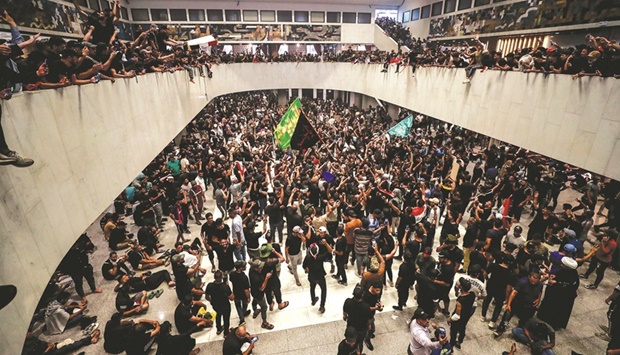Thousands of supporters of Shia populist cleric Moqtada al-Sadr stormed Baghdad’s fortified government zone and broke into parliament yesterday for the second time in a week, leaving at least 125 people injured and escalating a political stand-off.
They entered after thousands of protesters had massed at the end of a bridge leading to the Green Zone before dozens pulled down concrete barriers protecting it and ran inside, an AFP photographer reported.
Security forces had fired tear gas and water cannon near an entrance to the district, also home to foreign embassies and other government buildings.
Supporters of al-Sadr, who once led a militia against US and Iraqi government forces, oppose the recently announced candidacy of Mohamed Shia al-Sudani, a pro-Iran bloc’s pick for prime minister.
“We don’t want Mr Sudani,” said one protester, Sattar al-Aliawi, 47, in the parliamentary gardens.
He said they were protesting “a corrupt and incapable government” and would “sleep here”.
He added: “The people totally refuse the parties that have governed the country for 18 years” since a US-led invasion toppled dictator Saddam Hussain.
The protesters rallied by al-Sadr and his Sadrist Movement crowded the parliament chamber where some sat at lawmakers’ desks while others milled about, raising their mobile phones to film the occupation.
“The demonstrators announce a sit-in until further notice,” al-Sadr’s movement said in a brief statement to journalists carried by state news agency INA.
“We are calling for a government free from corruption ... and those are the demands of the people,” one protester, Abu Foad, said among crowds of protesters carrying placards with al-Sadr’s photograph and national flags.
The scenes followed similar protests on Wednesday, although this time at least 125 people – including demonstrators and police – were wounded, according to a health ministry statement.
During Wednesday’s protests, the participants left two hours later after al-Sadr told them to.
In yesterday’s protests, al-Sadr’s supporters threw stones and police fired teargas and stun grenades.
“We Iraqis have endured injustices because of those corrupt people,” said another protester Alaa Hussain, 49. “I have two unemployed children who graduated from university, and I am unemployed. There are no jobs and that is all because of corruption.”
Al-Sadr’s party came first in an October election but he withdrew his 74 lawmakers from parliament after failing to form a government which excluded his Shia rivals.
His withdrawal ceded dozens of seats to the Coalition Framework, an alliance of Shia parties allegedly backed by a regional country.
Al-Sadr has since made good on threats to stir up popular unrest if parliament tries to approve a government he does not like, saying that it must be free of foreign influence.
Al-Sadr’s supporters chanted against his rivals who are now trying to form a government.
Many protested in front of the country’s Supreme Court, which al-Sadr has accused of meddling to prevent him forming a government.
In response, the Coalition Framework called on Iraqis to protest peacefully “in defence of the state, its legitimacy and its institutions”, a statement read later yesterday, raising fears of clashes.
The United Nations called for a de-escalation.
“Voices of reason and wisdom are critical to prevent further violence,” said its mission in Iraq.
Prime Minister Mustafa al-Kadhimi also urged political groups not to escalate unrest.
“Let this not devolve into clashes, and keep Iraq secure,” he said in a televised address.
Speaker of Parliament Mohamed al-Halbousi suspended all parliamentary session until further notice, the state news agency reported.
Iraq has been without a president and prime minister for about 10 months because of the deadlock.
Al-Sadr, whom opponents also accuse of corruption, maintains large state power himself because his movement remains involved in running the country.
His loyalists have long run some of the allegedly most corrupt and dysfunctional government departments.
Iraqis linked neither to al-Sadr nor to his opponents say that they are caught in the middle of the political gridlock.
While Baghdad earns record income from its vast oil wealth, the country has no budget, frequent power and water cuts, poor education and healthcare, and insufficient job opportunities for the young.

Supporters of cleric Moqtada al-Sadr cheer after entering Iraq’s parliament in Baghdad.
